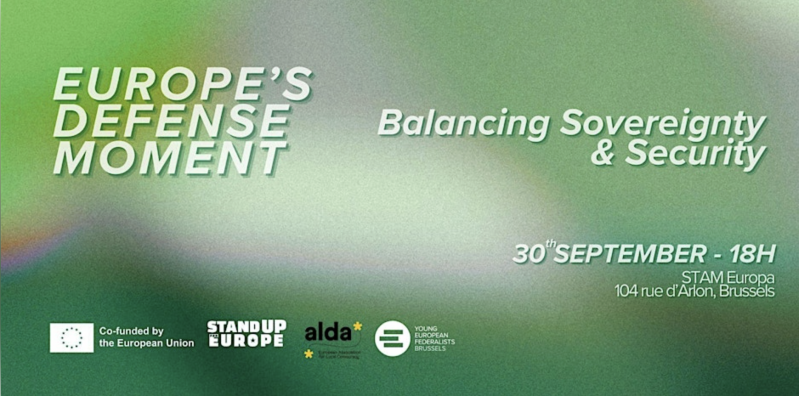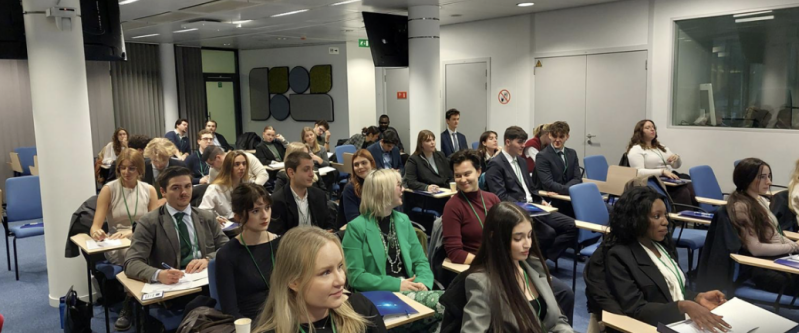Conferences


Conference
On September 30th, I had the opportunity to attend my first conference focused on military approaches to security, titled “Europe’s Defense Moment: Balancing Sovereignty and Security,” organized by the Young European Federalists (JEF) in Brussels. This conference offered a comprehensive introduction to Europe’s current defense policies, the challenges faced by European nations in ensuring security, and the delicate balance between national sovereignty and collective security efforts.
The event brought together policymakers, security experts, and young professionals interested in Europe’s defense strategies. The opening session emphasized the need for stronger European cooperation in defense and the importance of balancing the independence of individual states with collective security initiatives. Speakers highlighted recent developments in European defense policy, including discussions on joint military operations, coordinated intelligence sharing, and the establishment of rapid-response forces to address emerging threats.
A key theme of the conference was the tension between national sovereignty and European unity in defense matters. Many countries are cautious about surrendering control over military decisions to supranational institutions, yet security challenges, such as cyber threats, terrorism, and geopolitical tensions, require collaborative approaches. The discussions stressed that effective defense in Europe cannot rely solely on individual countries but requires a shared strategy and pooling of resources. The speakers explained how European nations are exploring frameworks to maintain their sovereignty while contributing to a collective defense system that can respond quickly and efficiently to crises.
Another important topic covered was the role of technology and innovation in security. Presenters shared insights on the development of modern defense tools, including cybersecurity measures, drone technology, and advanced intelligence systems. They emphasized that technological advancements are reshaping how European countries plan, coordinate, and execute their defense strategies, making collaboration across borders even more critical.
The conference also included interactive sessions where attendees could ask questions and engage in debates about Europe’s defense priorities. I personally found the discussions on balancing political independence with the need for cooperation most enlightening. Hearing different perspectives from experts and peers helped me understand the complexity of security planning in a multi-state context and the importance of dialogue and diplomacy alongside military strength.
Overall, attending this conference was a valuable experience that introduced me to Europe’s defense policies, highlighted the challenges of maintaining security in a diverse region, and offered practical insights into the role of collaboration and innovation in modern military approaches. It strengthened my understanding of military strategies, international cooperation, and the critical role of young professionals in shaping the future of European security.


Conference
I attended my second conference on European security and humanitarian issues, titled “The Politics of Refugee Protection in Europe: Present, Past, and Future,” led by Catherine Woollard. With extensive experience in migration law, human rights, and refugee advocacy, Catherine offered a detailed and engaging overview of how Europe manages refugee protection, the challenges faced, and potential future developments.
The conference began with an analysis of the current refugee situation in Europe. Miss Woollard shared key facts and figures, explaining the scale and diversity of refugee arrivals. She discussed the legal frameworks in place to protect refugees, highlighting how European and international laws interact with national policies and political decisions. This introduction clarified the complex relationship between humanitarian obligations and practical political considerations.
A major focus of the talk was comparing present-day approaches with historical practices. By looking at how Europe handled past refugee crises, Catherine showed patterns of challenges and successes that continue to influence current policies. She stressed that while history offers important lessons, each refugee situation is shaped by unique social, economic, and political contexts, requiring adaptable and forward-looking solutions.
The political dimension of refugee protection was another key topic. Woollard explored the tension between national sovereignty and European or international commitments, showing how public opinion, media, and political interests impact policies. She also emphasized the work of NGOs, civil society organizations, and European institutions in filling gaps, supporting refugees, and advocating for effective protection measures.
Finally, the conference looked toward the future of refugee protection in Europe. She encouraged attendees to consider emerging challenges, including new migration patterns, evolving legal frameworks, and opportunities for international cooperation. She highlighted the importance of proactive policies, collaboration between countries, and strategies for integrating refugees, while balancing security concerns and resource management.
Attending this conference significantly enhanced my understanding of migration and refugee issues in Europe. It offered insight into the legal, political, and historical dimensions of refugee protection, showing how humanitarian, security, and political factors are interconnected. The session also reinforced the importance of advocacy, diplomacy, and cooperation in shaping effective policies, providing valuable lessons for anyone interested in European security, human rights, and social policy.


Conference
I participated in a study visit to the European External Action Service (EEAS) headquarters in Brussels. This visit offered a valuable opportunity to gain insight into how the European Union organizes its diplomatic and security efforts, and how these efforts relate to regional and global stability.
The visit began with an introduction to the EEAS, explaining its role as the EU’s diplomatic service. The EEAS coordinates foreign policy, supports EU delegations abroad, and promotes European interests in international relations. This session highlighted the link between diplomacy and security, showing how political, economic, and military considerations are integrated to maintain stability and prevent conflicts.
The first session focused on the EU’s engagement with Southeast Asia, presented by a policy officer from the South-East Asia Division. The presentation explored the EU’s strategies for promoting security, stability, and cooperation in the region. Key topics included regional security challenges, conflict prevention, and the coordination of political and military measures to support peace and stability. The session emphasized the importance of multilateral diplomacy, international law, and the use of both civil and military tools to respond effectively to security threats.
The second session covered EU–Latin America and Caribbean (LAC) regional cooperation, presented by a senior official from the Americas Department. This session examined how the EU approaches security and stability in the Americas, including conflict prevention, crisis management, and cooperation with local governments and regional organizations. The discussion highlighted how the EU integrates diplomatic, development, and security measures to address cross-border threats, such as organized crime, terrorism, and political instability. Attendees also learned about the strategic role of the EU in fostering partnerships that strengthen regional security frameworks.
The study visit concluded with reflections on the EU’s overall approach to security and international cooperation. It became clear that European security is not only dependent on military capabilities but also on diplomacy, multilateral coordination, and comprehensive strategies that combine political, economic, and military tools. The visit illustrated how the EU plans and implements security policies in different regions, balancing respect for sovereignty with collective efforts to prevent crises and maintain peace.
Overall, this experience enhanced my understanding of military approaches to security within a broader diplomatic framework. It provided insight into how international cooperation, strategic planning, and regional partnerships contribute to stability, demonstrating the complex interplay between military measures and political decision-making in modern European security.